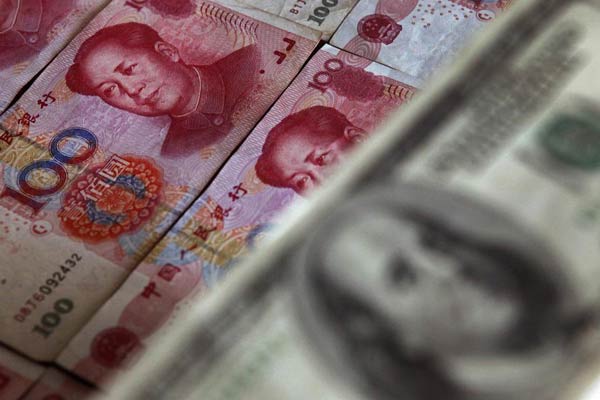 |
|
A photo illustration shows a $100 banknote placed above Chinese 100 yuan banknotes in Beijing in this May 10, 2013 file photo. [Photo/Agencies] |
The reference rate of the yuan rose to 6.4941 against the US dollar at 7:00 pm, up over 1.2 percent from Feb 5, the previous trading day before the week-long holiday.
The rise dispelled market concerns and came after comments from Zhou Xiaochuan, governor of the People's Bank of China (PBOC), in an interview with magazine "Caixin."
Zhou said that there is no basis for the continued depreciation of the yuan and that "China would not let market sentiment be dominated by speculative forces."
The central parity rate of the yuan strengthened by 196 basis points to 6.5118 against the US dollar on Monday.
The strong performance reversed drops in January when the market was permeated by depreciation talk.
Depreciation pressure has been eased due to sharp declines in the US dollar index and weakening expectations since the beginning of February of a Federal Reserve's rate hike.
Global stock markets and crude prices fell heavily last week. "Given the volatility in overseas markets, the yuan turned out to be a safe haven," said Xu Hanfei, an analyst with Guotai Junan Securities.
China will keep the yuan stable versus a basket of currencies while allowing greater volatility against the US dollar, Zhou said, adding that yuan exchange reform would help the market be more flexible in dealing with speculators.
While China has the world's largest foreign exchange reserves, Zhou said, speculators should not be allowed to dominate market sentiment and it was quite normal for reserves to fall as well as rise.
China's foreign exchange reserves dropped by $99.5 billion from December to $3.23 trillion at the end of January, the central bank said Sunday.
The decrease was milder than the decline of $107.9 billion registered in December, the sharpest monthly fall on record.
Zhou dismissed rumors that China will increase foreign exchange control. The rumors even involve control of trade accounts, which is absurd, Zhou said, claiming rumors are fabricated to create panic and benefit speculators.
China allowed?renminbi convertibility on the trade accounts nearly two decades ago, but almost all capital account transactions in the mainland remain under varying degrees of control. Going by IMF classifications, 37 of 40 capital account items are already fully or partly convertible in China, leaving only three unconvertible.
The central bank will upgrade its macro prudential policy framework, an approach to financial regulation aimed at reducing systemic risks, according to Zhou.
The new mechanism, macro prudential assessment, will take into consideration seven aspects when evaluating the financial system to prevent systemic risks and improve counter-cyclical adjustment, the PBOC said in a statement at the end of 2015.
The capital adequacy ratio, a measure of an institution's ability to cushion loan risks, will be the core of the assessment, said the PBOC.
While guarding against "systemic risks in the economy, China should prevent "cross infection" between the stock, debt and currency markets, Zhou said.
China's economy grew by 6.9 percent year-on-year in 2015, its lowest annual expansion in a quarter of a century.
However, foreign direct investment into the Chinese mainland continued to grow steadily in January despite slowing overall growth, the Ministry of Commerce said on Monday.
FDI, which excludes investment in the financial sector, rose 3.2 percent year on year to $14.1 billion last month, with investment in the service sector taking the lion's share.
